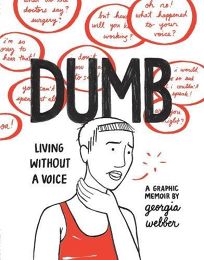Thursday Comics Hangover: Speechless, rendered
Montreal cartoonist Georgia Webber lost her voice after severely straining her vocal cords. Her new book from Seattle publisher Fantagraphics, Dumb: Living Without a Voice, is a memoir about what happened next.

Aside from a tendency to sing in the shower, you don't get a sense that Webber is an especially verbal person. She doesn't strike the reader as too talkative, or especially gregarious. But when her ability to speak disappears, Webber realizes how much she relied on verbal communication to interact with the world.
"Mostly I'm ok, even good, but some days I just freeze," Webber writes in Dumb. "I am so, so scared."
The most impressive part of Dumb is the way that Webber doesn't fall back on tricks to relate her experiences without a voice. It would be too easy to fill the book with captions and thought balloons that explain every detail of her inner life to readers. Instead, Webber uses a hodgepodge of communication methods: journal pages, a swirl of word balloons, textless sequences, and purely visual representation.
Webber's nonstop array of techniques to tell the story of Dumb mirrors her techniques to communicate with the world when she loses her voice: she talks with people using pens and paper, using phones to text her thoughts, using signals like wearing makeup on days when she's incapable of even communicating with a whisper.
The best part of Dumb, though, and the thing that elevates it from merely a good memoir into a higher realm of artistic achievement, is the confusion that Webber allows onto her page. Some word balloons — hell, some whole panels — are scratched out entirely. Word balloons are overlapping. Some pages are all text. Others are all drawings. When her mood is particularly low, Webber draws pages as dense inky baths.
And as Webber's anxiety rises, the only color in the book — a bright, almost neon red — shows up more on the page. Webber draws auras around herself in this red to demonstrate the wall her silence throws up between her body and the world. The reds seep in to surround word balloons to illustrate the power that speaking can have over her. They illustrate the pressure building on her at parties and in other tense social settings.
Dumb isn't quite a medical memoir, and it's certainly not a harrowing story of survival. What it is, is a portrait of interiority, a record of a time in which Webber felt cut off from the world and how she learned to be comfortable — or as comfortable as possible — with that isolation.